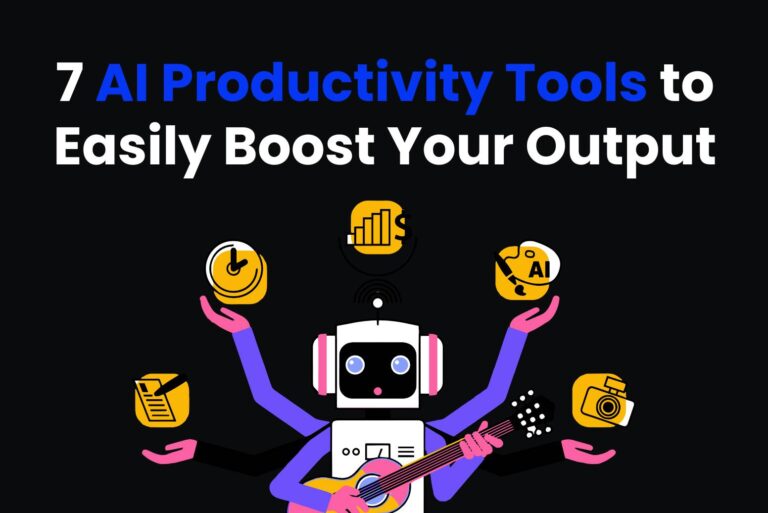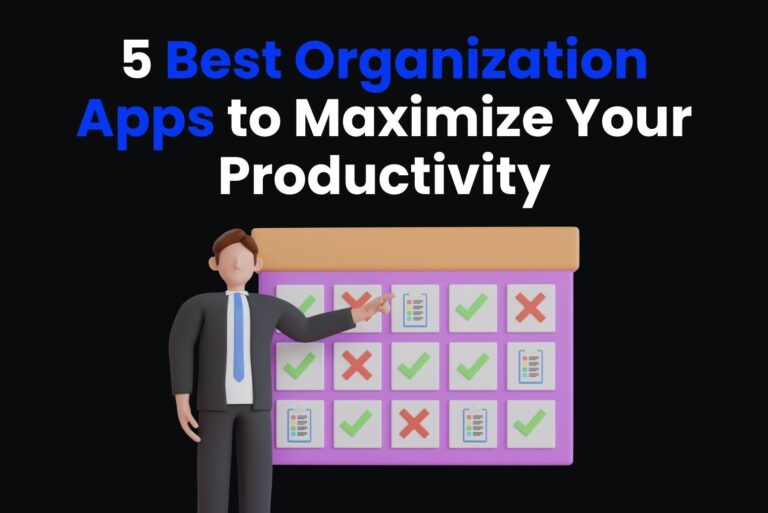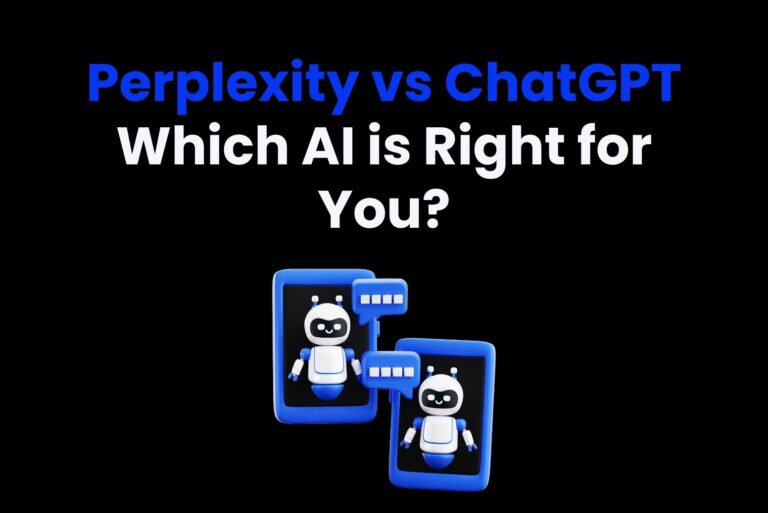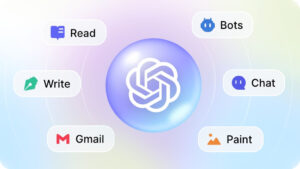Obsidian vs Notion — A Detailed Comparison (2024)
Writing down things is one of the first and easiest steps to living a tidy life. You can always pick up paper and pen to work, but it’s an old-fashioned way of doing it. Instead, if you write down digitally with an app or service, the scope of what you can do in a memo will increase.
But which digital tool should you use? There are many options available, but two of the most popular ones are Notion and Obsidian.
Notion is an all-in-one workspace that lets you create, manage, and collaborate on various types of documents, such as notes, wikis, databases, and projects. Obsidian is a personal knowledge base that lets you create, link, and explore your notes as a network of interconnected thoughts.
Both of these tools have their own strengths and weaknesses, and depending on your needs and preferences, you may find one of them more suitable for you than the other. That’s why we recommend that you compare the two services Obsidian vs Notion and see how they differ in terms of features, functionalities, pricing, and user experience. By doing so, you can make an informed decision and choose the best tool for your note-taking and productivity needs.
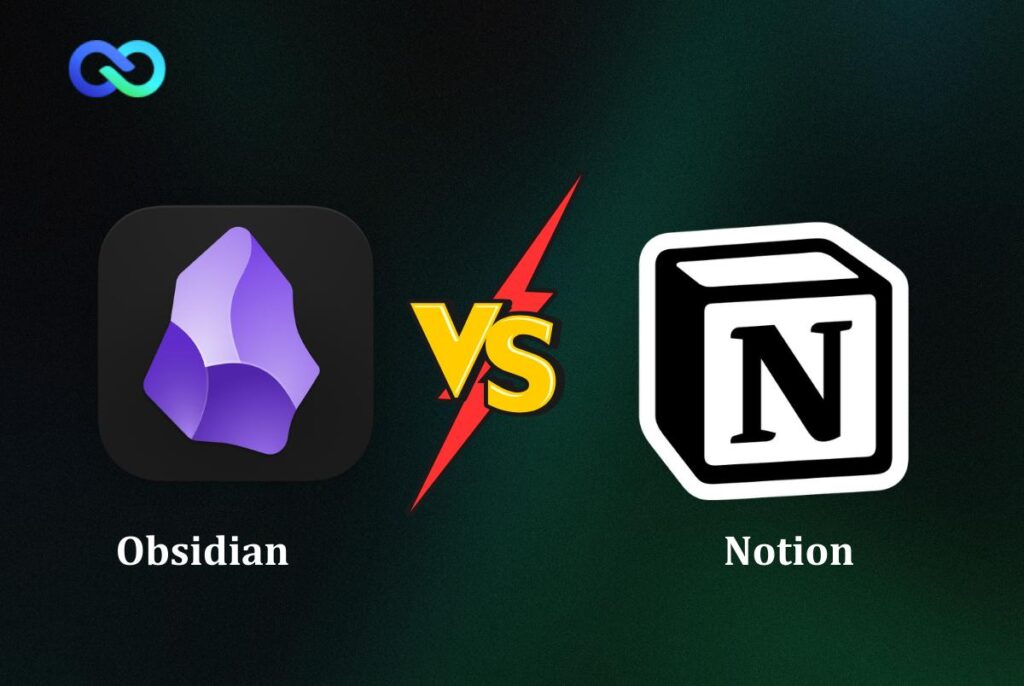
Obsidian vs. Notion Comparison Overview
The main characters in this article are Obsidian vs Notion. But how do they compare? How do we utilize their strengths? Dig deeper into which Obsidian and Notion are your ideal productivity partners.
Obsidian
Obsidian is a private and flexible writing app designed for personal note management. We focus on data privacy by storing notes locally on our devices and supporting offline access.
The app is highly customizable with hundreds of plugins and themes, allowing users to shape it according to their thoughts. Obsidian uses open, non-exclusive files to ensure long-term data storage without locking users to a specific format.
Main Selling Points
- Privacy and Offline Access: Notes are stored on your device to ensure confidentiality and offline access.
- Customization: Customize with hundreds of plugins and themes.
- Link Notes: The ability to create complex connections between notes to build a personal Wikipedia.
- Graph: Visualize the relationship between notes in an interactive knowledge graph.
- Plugin Support: Includes calendar, canvas board, advanced query, list management, and task tracking plugins.
- Synchronization and Collaboration: Military-grade AES-256 encryption provides synchronization, version history, and collaboration options between devices.
- Obsidian Publish: Seamless editing, customization, and optimized performance make your notes an online wiki, knowledge base, and digital garden.
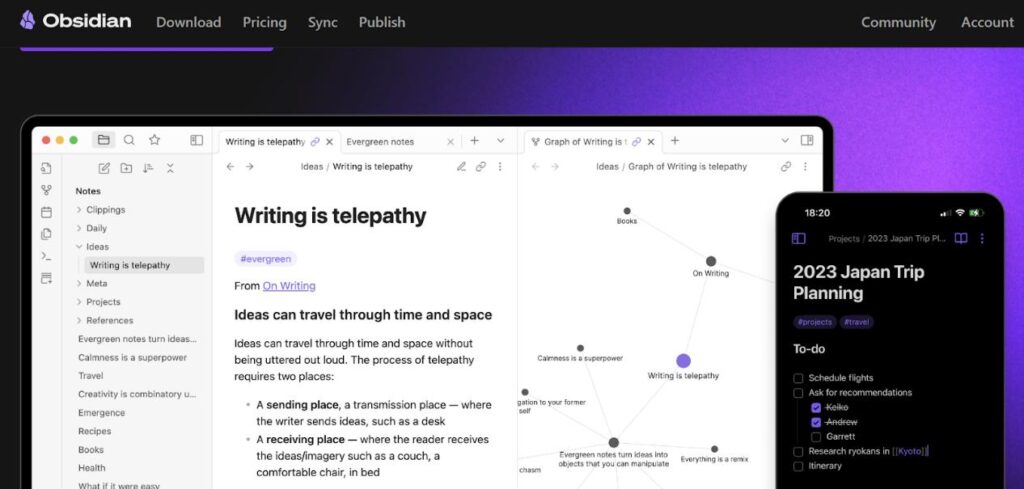
Notion
The Notion is an all-in-one digital platform designed to organize and store various data types, including everyday projects, business essentials, and personal documents. Features such as notes, project management, and task management are suitable for individuals, professionals, and teams. Notion AI is advance and update but here we have comparison of Notion AI with ChatGPT.
Notion provides a comprehensive solution for users to centralize all information and visualize and organize data.
Main Selling Points
- All-in-one workspace: Integrate notes, to-do lists, wikis, spreadsheets, and project management into one tool.
- Centralized data managing: Idol for managing enterprise and personal data, including web layout projects, recipe databases, fitness logs, and transaction calendars.
- Flexible Data Organizing: Organize data using Pages and Blocks. There are various block types, such as text, tables, and ToDo lists.
- Upload and embed options: Supports embedding websites, uploading images, videos, audio files, and displaying PDFs.
- Advanced blocks and integration: Provide advanced blocks such as formulas, breadcrumbs, and tables of contents, and integrate them with software such as Google Drive and GitHub.
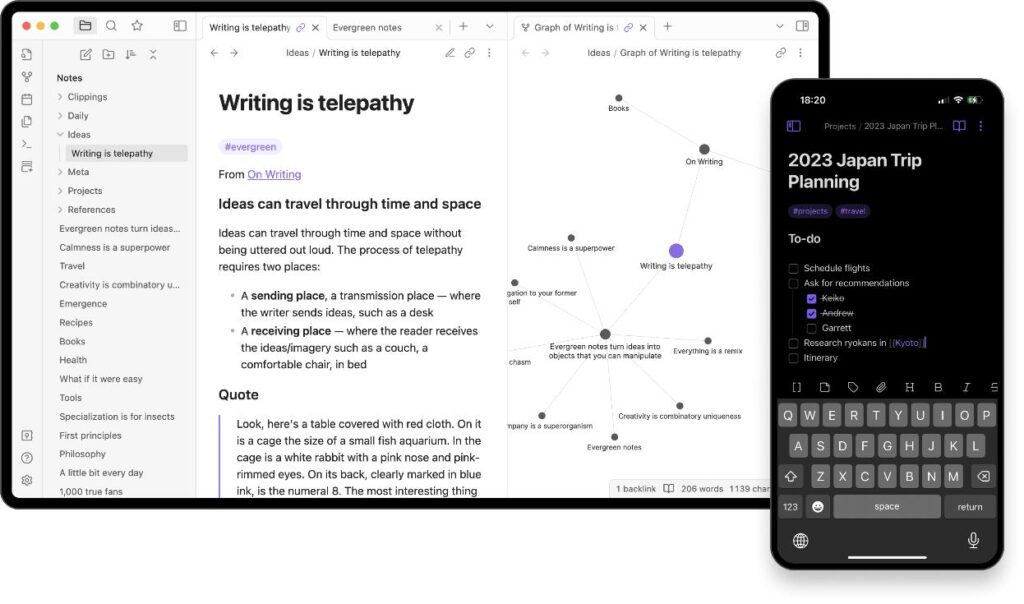
Obsidian vs Notion Collaboration and Teamwork
Efficient cooperation and Teamwork are important for many productivity software users. Let’s explore Obsidian vs Notion collaboration features.
Obsidian Collaboration Features
Obsidian primarily focuses on personal notes and knowledge management, making it less suitable for real-time collaboration and team workflows. The note can be shared with other users, but collaboration features are limited compared to collaboration platforms such as Notion.
Notion Collaboration Features
Notion excels at providing robust collaboration capabilities for teams. Provide real-time editing, comments, task assignments, and notifications, allowing teams to collaborate seamlessly on shared documents and projects. Our business plan also includes advanced management controls for user management and permissions.
If real-time collaboration and team workflows are critical to your productivity needs.
Customization and flexibility
The ability to customize and adapt productivity software according to personal preferences is an important consideration. See the customizability and flexibility that Obsidian and Notion offer.
Notion offers a wide range of options to customize your workspace to your preferences. Users can create custom templates, design their own layouts, and configure content by selecting from various block types. The flexibility of Notion also extends to integrating with third-party tools, enabling users to enhance workflows with apps they already use.
Obsidian customization is in the plug-in ecosystem, and Notion offers a wider range of customization capabilities within the platform.
Obsidian vs Notion Comparison Mobile Accessibility
Accessing productivity tools on mobile devices is critical to always out-and-about users. Now we like to compare Obsidian vs Notion mobile accessibility.
Obsidian Mobile Accessibility:
At the time of writing this article, Obsidian does not have a dedicated mobile app. Users can use third-party apps to access Obsidian notes from their mobile devices, but experience varies, and some features may not be fully supported.
Notion Mobile Accessibility:
Notion offers dedicated mobile apps for both iOS and Android platforms. The mobile app provides a seamless experience that allows users to access and edit Notion documents from the go. The mobile app is highly designed and provides the same functionality as the web version of Notion.
If you prioritize mobile accessibility, Notion’s dedicated mobile apps offer a more reliable and consistent experience.
Obsidian vs Notion Plugins and Integration
Obsidian is built by plugins. Almost all Obsidian features are realized by the core plugin. Therefore, you can add new features to Obsidian by simply installing the relevant plugins. In this way, you can use Obsidian as a database by installing the Data View plugin. You can also use Obsidian as a Kanban organizer by installing the Kanban plugin. Moreover, you can integrate Grammarly extension for Notion. But you may think Grammarly vs ChatGPT: Which Is Better for You here you can deeply understand.
This attribute turns Obsidian into an uncut gem. Despite lacking built-in features, Obsidian offers a platform to customize with various plugins and make the most of your workflow. Obsidian APIs are freely available on GitHub, so if you have a specific plugin, you can try it yourself.
Conversely, Notion does not have a plug-in. Notion has many features built into the app to make up for that. Since there are so many features of Notion, plug-ins will not be needed unless other apps are integrated into Notion. In that regard, Notion has an API that developers can use to create custom apps that integrate with Notion.
Notion has a lot of integration features you can add to your setup. With the right integration, you can make Notion the ultimate workstation.
Data Security and Privacy
These are critical concerns when choosing productivity software. This section describes data security and privacy measures implemented by Obsidian vs Notion.
Obsidian Data Security and Privacy
Obsidian stores all data locally on the user’s device, enabling the user to fully manage the data. As a result, Obsidian enhances data privacy because the data is not stored on an external server.
Notion Data Security and Privacy:
The Notion is serious about data security and privacy. While storing user data on the server, NoTion uses industry-standard encryption protocols to encrypt data during storage and transfer. Our security measures include two-factor authentication, access control, and periodic security audits to ensure data protection.
Both Obsidian and Notion prioritize data security and privacy, but Obsidian’s local storage approach adds layers of data control and privacy.
Obsidian vs Notion Sharing and Collaboration
Obsidian is designed first and foremost for personal notes, which manifests in the lack of collaboration capabilities. If you purchase a synchronized version, you can share and edit your file vault with others (Figure E). However, you must use the Markdown language to leave comments, so comments do not work the same as other tools. You can’t even call someone on @. If you need such a collaboration feature, Obsidian will not fit your needs.
Figure E
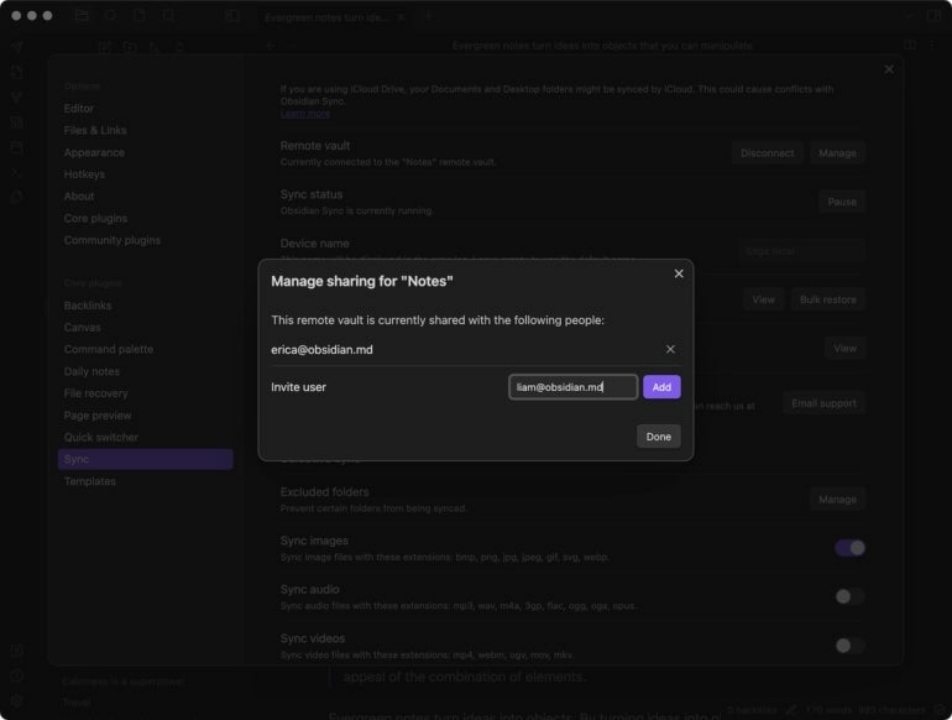
On the other hand, in Notion, you can comment on items (Figure F), tag colleagues in messages, reply directly to comments in tools, and respond to comments using emojis. There are no direct messages like Asana or native video chat options like Teamwork, so if you want to have a long discussion, you must migrate to another software like Slack or Zoom. However, Notion offers far more sharing and collaboration features than Obsidian, so if you are looking for a tool that you can use with your teammates, Notion would be a better choice.
Figure F
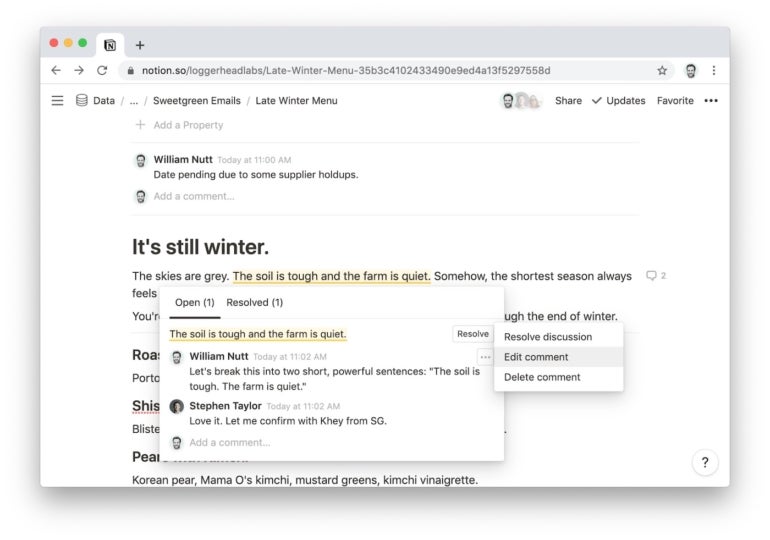
User Interface
Both Obsidian and Notion have unique design philosophies in terms of user interface and comfort of use. Obsidian has a minimal interface that focuses mainly on taking notes and creating a network of ideas. At first, “linking notes to each other” may be difficult for the first person, but once you get used to it, the user appreciates its simplicity and concentration. Obsidian does not customize the appearance but maintains a clean, distracting workspace so users can connect their thoughts. On the other hand, Notion excels in visual appeal and flexibility. The sophisticated and intuitive UI allows users to create pages and sub-pages and easily move and edit blocks for various types of content, from text and images to databases. However, you may need clarification at the beginning of use because there are too many functions and settings. Because of the rapid learning curve, new users may find it difficult to handle Notion. However, beyond this hurdle, the content management and organizing functions of Notion can be truly rewarding. You can also select databases from various views, such as grids, lists, and timelines, or change the page icons and cover images to make your workspace more personal and visually attractive.
Obsidian vs. Notion comparison: price comparison
Price is an important factor to consider when choosing productivity software. Compare Obsidian and Notion pricing models and choose the best one for your budget.
Cost of Obsidian
- Personal: Obsidian offers a free plan with basic features and unlimited notes.
- Commercial: The commercial Plan costs $50 per user per year and includes advanced features for commercial use.
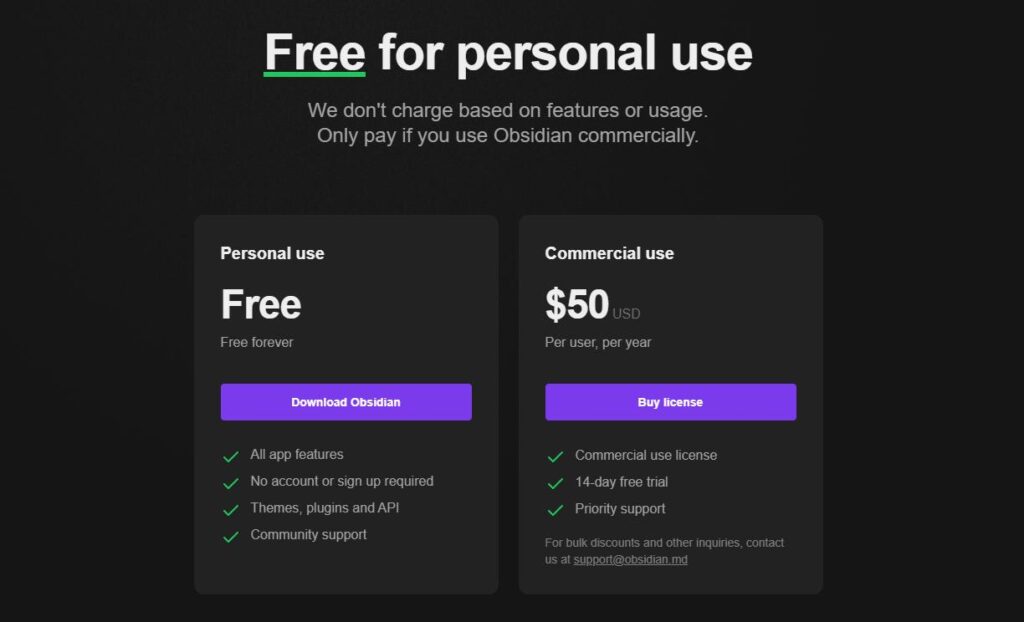
Cost of Notion
- Personal: Notion offers a free plan for individuals with basic features and limited storage.
- Plus: Plus Plan provides unlimited file uploads, version history, and other extensions for $10 per user per month ($8 per user per year).
- Business: The Business Plan costs $18 per user per month ($15 per user per year) and provides advanced collaboration and management controls.
- Enterprise: Notion’s Enterprise plan provides custom pricing and customized solutions for large organizations.
Obsidian and Notion pricing plans support different user needs and budgets. Obsidian pricing is more understandable, and Notion offers a phased pricing structure based on individual and team requirements.
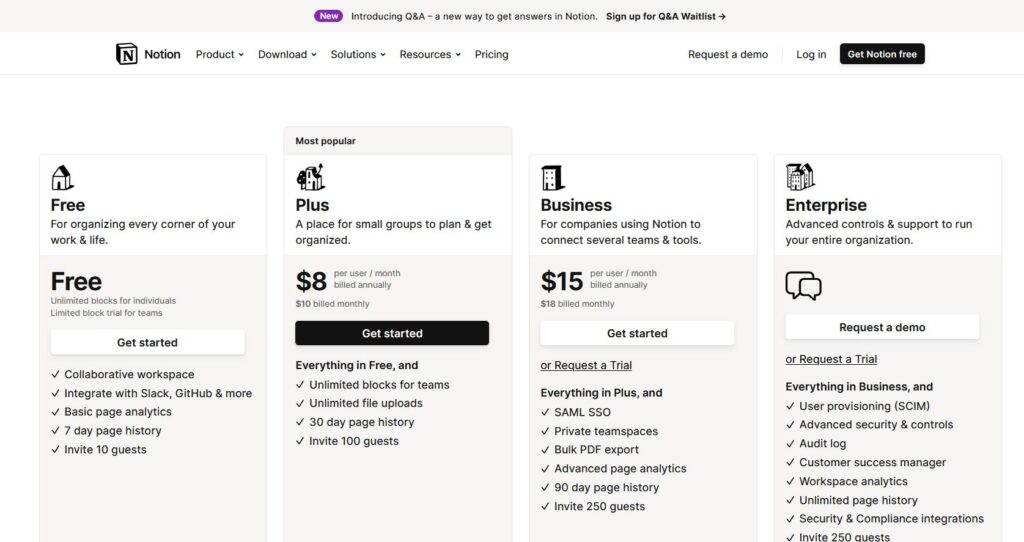
Pros and cons of Obsidian
Pros of Obsidian
Strong links and backlinks Obsidian’s bi-directional links allow users to build a network of connected notes, making it more comfortable to navigate and find relevant information.
- Markdown Support: Obsidian uses Markdown for text formatting, making it ideal for users accustomed to this lightweight markup language to write without distractions.
- Local Storage: All data is stored locally, allowing users to fully manage information without relying on cloud services.
- Customizable interface: Obsidian provides advanced customization, allowing users to personalize the look and layout of the app to their liking.
- Active Community and Plugins: Obsidian has a rich user community that contributes to the development of various plugins and themes that improve the functionality and aesthetics of the software.
Cons
- Fast learning curve: Obsidian’s rich features and links can take a while for users to fully understand and integrate into their workflow.
- Limited mobile support: Obsidian is accessible from mobile devices but is not as seamless as the desktop user experience.
- No native cloud synchronization: Unlike cloud-based solutions, Obsidian does not provide native cloud synchronization, so you need to synchronize manually to access multiple devices.
- Lack of collaboration: Obsidian is designed primarily for personal knowledge management and needs to incorporate collaboration capabilities for team-based projects.
- No attachments: Obsidian does not directly support file attachments in notes in the current version. This can be a limitation for some users who need multimedia integration.
Pros and cons of Notion
Pros
- Multifunctional, all-in-one: Notion is a comprehensive tool that integrates notes, project management, databases, wikis, and more into one platform to reduce the need for multiple apps.
- Powerful Collaboration: With real-time editing, comment, and mention capabilities, Notion excels in team collaboration and promotes efficient communication and Teamwork.
- Flexible configurations: Block-based structures allow users to create dynamic layouts, easily sort content, and build custom databases for different workflows.
- Rich media integration: Notion supports a variety of media types, including images, files, and embedded content, making it ideal for organizing multimedia-rich information.
- Cross-platform enabled: Notion can be accessed seamlessly from any web browser, desktop (Windows, macOS), or mobile device (iOS, Android).
Cons
- Learning curve: Because of its rich functionality and flexibility, new users may feel that the learning curve is steep when compared to simple note apps.
- Limitation of offline access: Although Notion has offline functionality, it is impossible to use all features offline, which can be a restriction for users in areas with unstable Internet connectivity.
- There are limitations on exporting data: There are limitations on data exports from Notion, which may be a concern for users wanting to back up data and migrate to other platforms.
- Pricing: Some users may feel that the fee plan for Notion is relatively high, especially when compared to basic memo apps.
- Performance Problems: When dealing with large databases or complex pages, the performance of Notion may be degraded, the load time may be slowed, or a lag may occur.
Frequently Asked Questions
Which is better for Notion and Obsidian?
Notion and Obsidian are powerful note apps but have advantages and disadvantages. With flexibility and an all-in-one workspace approach, Obsidian is known for its powerful organizing capabilities and sophisticated design. After all, either of these two choices depends on your personal preferences and workflow.
What is better than Obsidian?
Several note apps offer unique features and benefits over Obsidian. Popular alternative apps include Evernote, OneNote, and Bear. The best apps depend on your needs and preferences.
Can I transfer my Notion to Obsidian?
Yes, it is possible to transfer Notion data to Obsidian. Obsidian has built-in importers that allow you to import data from Notion and other note apps. Detailed instructions are provided in the Obsidian documentation.
What is the difference between Apple Notes, Obsidian, and Notion?
Apple Notes is a basic note app that is pre-installed on Apple devices. Integrate seamlessly with other Apple apps with a simple and easy-to-understand interface. Obsidian and Notion are more advanced memo apps with more features and customization options. The Notion is an all-in-one workspace approach, and Obsidian is known for its powerful organizing capabilities.
What is better than Notion?
Several note apps offer unique features and benefits over Notion. Evernote, OneNote, and Bear are famous. The most reasonable app for you relies on your specific requirements and preferences.
What kind of person is Notion best for?
The Notion is ideal for users who want a flexible, all-in-one workspace that can handle a variety of tasks and workflows. Especially suitable for individuals and teams who need to manage multiple projects and databases simultaneously.
Is Notion 100% free?
No. There is also a free plan, but there is also a paid plan. In the free Plan, there is a limit to the number of pages and databases you can create.
Conclusion
In conclusion, Obsidian vs Notion offer unique features that enhance productivity and organizational workflows. Obsidian is a powerful note-making tool focused on creating a web of interconnected notes, and Notion provides a comprehensive collaboration platform with a wide range of features to increase team productivity.
If you prioritize personal knowledge management, privacy, and local storage, Obsidian backlinks, and graph display functions are attractive choices. And while you’re exploring their features and functionalities, don’t forget to try out Arvin, our amazing AI-powered research assistant. Arvin can chat with you on any webpage and provide you with instant insights, research support, and writing assistance. Whether you need to find relevant information, organize your thoughts, or polish your writing, Arvin is here to help. Visit arvin.chat today and see how Arvin can enhance your productivity and workflow!
After all, whether you choose Obsidian or Notion depends on your requirements and preferences. Using the free Plan of both tools is recommended to consider which best matches your productivity target.
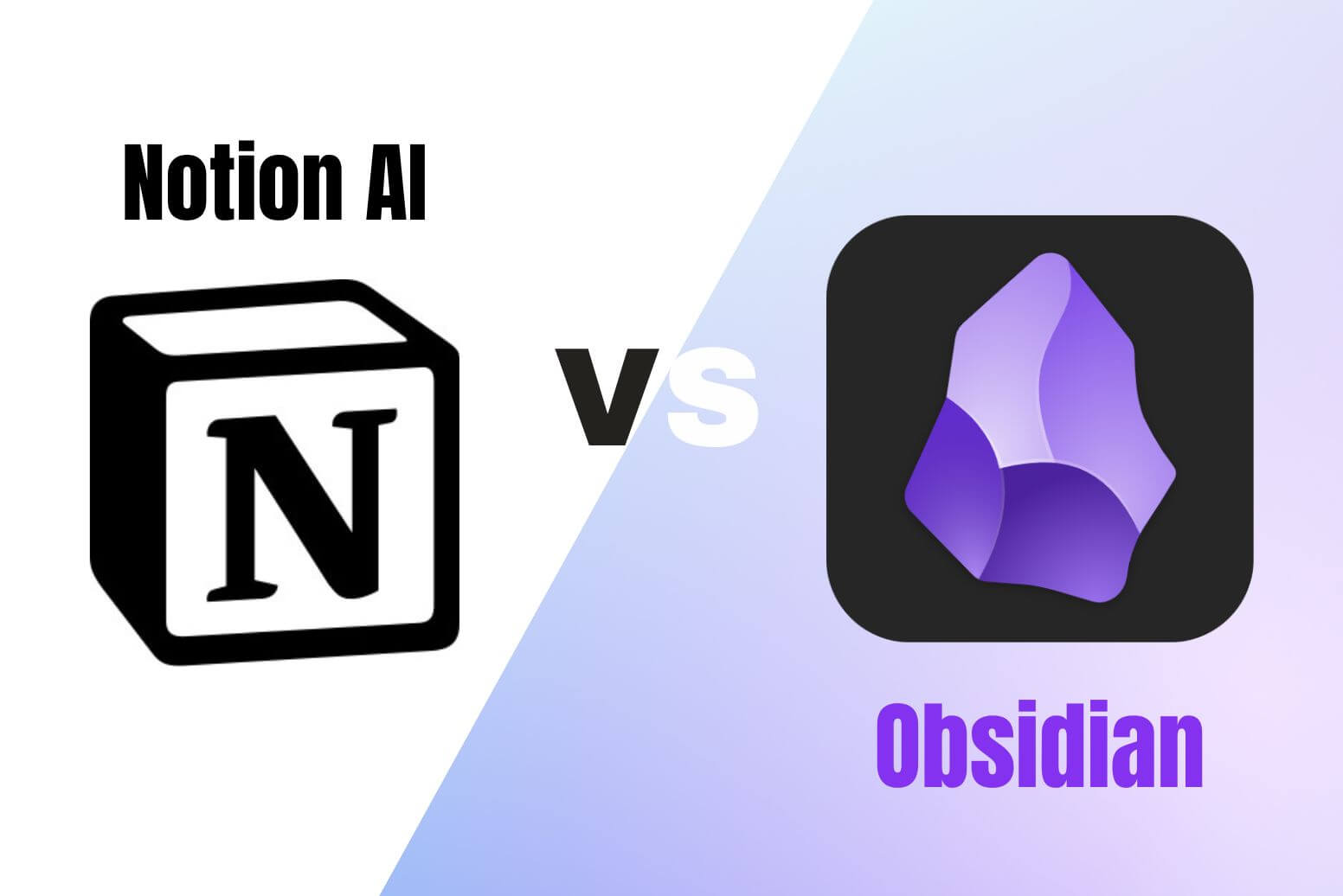
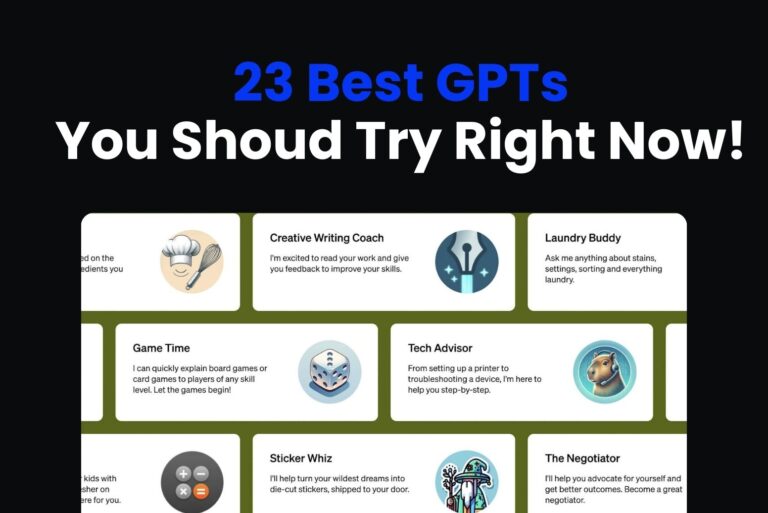
![How Does AI Detection Work? The Ultimate Guide [2024]](https://arvin.chat/wp-content/uploads/2024/03/How-Does-AI-Detection-Work_-The-Ultimate-Guide-2024-768x513.jpg)
